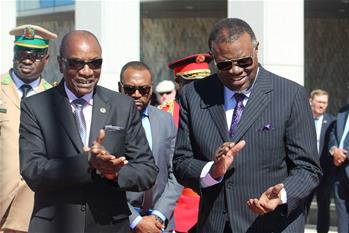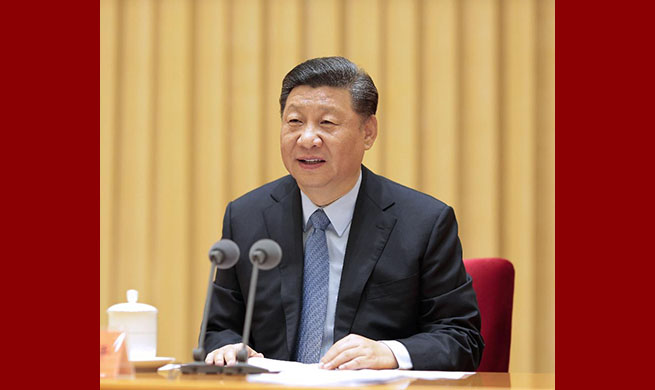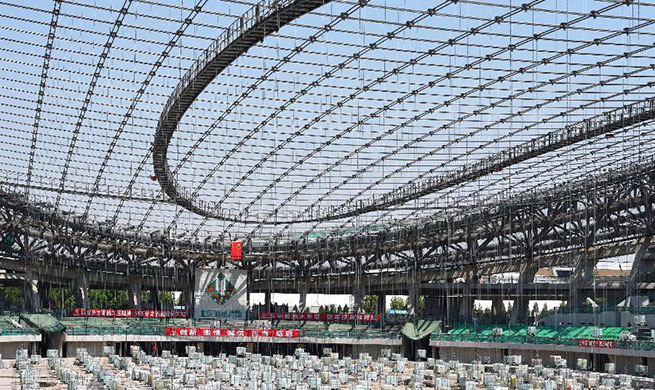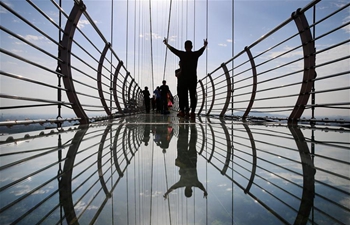by Dana Halawi
BEIRUT, May 10 (Xinhua) -- Lebanese bankers expressed Friday their worries about the government's pressure on banks to finance the state in a bid to reduce the country's budget deficit in 2019.
"The government cannot pressure through legislations the banking sector to fund the state, which may negatively impact this sector and Lebanon's credit rating," Salim Sfeir, chairman of Bank of Beirut, said during a conference in capital Beirut.
The conference was held to discuss the latest financial developments in Lebanon and the negative repercussions that the new state budget may have on banks and on the economy in case the government decides to impose new taxes on the sector.
Sfeir said that banks have paid taxes valued at around 2 U.S. billion dollars in 2018.
The government has been calling for more support from banks by subscribing to Treasury Bills at a non-market rate of 1 percent in a bid to reduce the cost of debt servicing which could reach 58.6 percent of the government's revenues by 2021 if the fiscal deficit maintained the same momentum, according to Moody's Investors Service.
It is worth noting that Lebanese banks are highly exposed to sovereign debt in Lebanon.
Also, Finance Minister Ali Hassan Khalil has announced a few days ago the 2019 state budget will witness an increase in the rate of interest tax on deposits in banks from 7 percent to 10 percent.
"The increase ... will lead many big depositors, especially expatriates, to move their money outside Lebanon," Sfeir said.
He added that small and medium-sized depositors also rely on the interest on their deposits to survive.
"All experts are well aware that it is not a healthy policy to increase taxes in times of stagnation because this will negatively impact growth rate in the country," he explained.
Likewise, Nassib Ghobril, economist and head of the economic research department at Byblos Bank, told Xinhua that the measures that the government wants to implement are "terrible."
"It is never advisable to forces banks to subscribe to Treasury Bills at a non-market rate of 1 percent," he said.
He added that increasing interest tax on deposits will worsen the situation because it affected the income of thousands of retirees who depend on their deposits interests to survive.
"Also, expatriates have previously complained because they already pay an income tax in the countries in which they work," he said.
Ghobril explained that increasing interest tax on deposits will lead to an increase in the cost for banks because depositors will then ask for higher interest rates on their deposits.
"When interest rates on deposits go up, interests on loans also increase ... which leads to economic contraction," Ghobril explained.
Ghobril also explained that banks are already subject to a tax rate of 40 percent on their profits in addition to paying a 7-percent tax on interests on treasury bills.
Pierre Khoury, a Lebanese economist, told Xinhua that the banking sector is reluctant to re-finance the government without any real commitment to implement real reforms.
Some of the reform measures that must be taken by the government, according to analysts, to reduce the state's budget deficit include the complete overhaul of the public sector and the electricity sector in addition to the fight against corruption and tax evasion.
Politicians have been pledging to undertake needed reforms in the new 2019 budget but they are also aiming at adopting harsh measures by imposing taxes on banks while also cutting public sector's wages, prompting public sector employees to wage nationwide demonstrations in the past few days.
To curb Lebanon's budget deficit, which has increased to over 11 percent of its total GDP, the cabinet will seek to reduce the deficit by 1 percent each year over the next five years by limiting governmental expenditures.

















